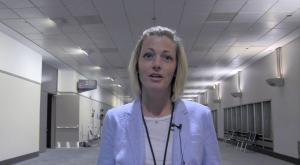
Aside from controlling what happens leading up to my death, I've given a lot of thought and put the wheels in motion for what will happen to me after I die.

Sarah DeBord was diagnosed with metastatic colon cancer at age 34. In the years since, she has turned her diagnosis into a calling, and become an advocate for other young adults diagnosed with colorectal cancer and parents with young families facing cancer. She works as a communications and program manager for the Minneapolis-based Colon Cancer Coalition , volunteers her time with the online patient-led support community COLONTOWN , and blogs about her often adventurous experiences of living with chronic cancer at ColonCancerChick.com.

Aside from controlling what happens leading up to my death, I've given a lot of thought and put the wheels in motion for what will happen to me after I die.

To tell or not to tell? That is a question I ask myself at the start of every school year. Do I tell my children's teachers I have cancer?

The search for a clinical trial would turn out to be my most daunting mission yet as a patient with cancer. Here are five important lessons I've learned throughout my search.

A quick scroll through the list of clinical trials made it clear I didn't know enough about my tumor and the mutations that made it unique.

We have to find light in the darkness of cancer not just for ourselves, but for those that will come after us.

I have two perspectives as I look at clinical trials: as the patient needing one and as an advocate encouraging patients to enroll in them. But how can I encourage someone to do something that I personally find so frustrating?

Since being diagnosed with cancer, I can't walk into a grocery story without hearing B.B. King sing "The Thrill is Gone." My relationship with food changed, and I often wonder if we'll ever be able to fall in love again.

Another attempt to help by my friends only brought more work and stress to our home.

The expenses of cancer far extend what is covered by insurance, and the damage it can do can forever alter the life of a young adult with cancer.

As much as patients look forward to the day they can ring the bell or hear they have no evidence of disease, it can also mean they will be sent out on their own to sort through life with the long-term damage of cancer.

One is meant to improve quality of life and the other is meant to care for end-of-life. Yet the two specialties of palliative and hospice care still continue to be confused not only by the patient, but also the provider.

Why use one term over the other? It's not about exclusion, but rather inclusion and reaching all at risk for this disease-- which happens to be everyone.

In the patient-centric world of oncology, let's not overlook who stands watch and gives without expecting anything in return.

Your disease does not make you unworthy, because only the worthy will see past it.

I've had many outward signs that let the world know I had cancer, so the latest addition to my wardrobe didn't exactly make it much more obvious.

I vaguely knew what lymphedema was, and assumed it was something that only happened to breast cancer patients. But you know what they say about making assumptions.

I never fully understood how ingrained my children were in my soul until I had to give serious thought to the end of my own life, and I knew I didn't want to face it without them.

As cancer once again robbed me of the chance to make the holiday memories I had hoped for, it took a kid eating frozen pizza on Christmas Eve to remind me what really mattered.

When bad things happen to friends we care about, we often stand in silence because we don't know what to say.

As patients, we need to remember that we may not wear the white coat, but we definitely wear the pants in the doctor-patient relationship

Having a health care directive in your medical records is one favor you can do your family, and in some of the most unexpected and unavoidable times, they will be grateful you have it.

I would tune out or give an unsympathetic nod when I would hear people talk about anxiety because I didn't understand what it really was or how paralyzing it could be. That was until I got cancer.

When I was first diagnosed, I searched for the stories that would give me hope in the darkness that surrounded me. Seven years later, I continue to pay it forward by putting my own story out there for the next person who needs it to find.

Being a patient advocate comes in many forms, and not all of them require you to get out of bed to storm the halls of Washington.

My son was visibly proud to show me off to his class that day, and I was secretly proud to send his classmates home to talk about poop at the dinner table.

Advice for the inoperable facing a lifetime of treatment.

Choosing to connect with other patients doesn't come without loss, but the benefit of being empowered by others makes you a better patient and more impassioned survivor.

Fighting cancer is hard, but fighting it when you have to bring your kids along for the ride makes it even harder.

Getting a third opinion probably didn't save my life, but it definitely bought me more time.

Dating after cancer can be scary, but dating with cancer can be down right daunting.

Published: June 8th 2018 | Updated:

Published: August 27th 2018 | Updated:

Published: September 1st 2018 | Updated:

Published: September 6th 2018 | Updated:

Published: September 15th 2018 | Updated:

Published: September 26th 2018 | Updated: